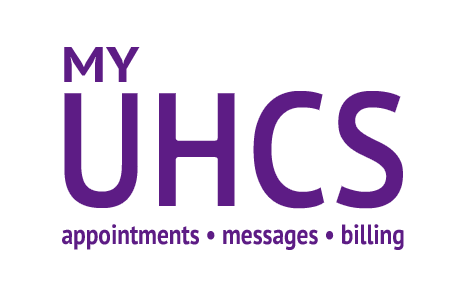Test Anxiety
Wellness Information
UHCS Services
Counselors at UHCS are available to help you explore, learn, and practice strategies that can help you to reduce your level of anxiety before and during tests/exams. Strategies may include cognitive techniques that focus on what you say to yourself while studying for exams and while taking exams. Other strategies may include behavioral techniques, such as breathing, relaxation and visualization strategies, used often in combination with cognitive strategies.
Overview
Most people experience some type of heightened anxiety at various times in their lives. Many college students experience increased anxiety when taking exams. Students have said they feel as though their “mind suddenly goes blank,” or their chest feels tight and their heart begins to beat faster. Students sometimes experience nervous tension throughout different areas of their body, often accompanied by increased sweat or perspiration.
Examples of helpful cognitive and behavioral strategies:
Guided Imagery and Visualization ~Use your mind to visualize something that is calming and relaxing for you. This could include visualizing yourself on a beach or some place in nature. Another strategy could be to visualize yourself taking the exam and completing the exam with success.
Meditation ~Practicing deep relaxation and meditation away from test situations can help reduce overall anxiety. Repeating a word or phrase, counting while breathing, or listening to meditation tapes are some techniques that focus your mind while allowing your body to relax.
Muscle Relaxation ~Tense an area of your body and hold for 5 seconds, then relax that body part for 5 seconds. Start at your feet and work your way up through your calves, thighs, stomach, arms, neck, and shoulders. Breathing can include inhaling while tensing the body part then exhaling while relaxing the same body part.
Mindfulness~ Mindfulness consists of focusing on breath. Focusing on your breathing rhythm will automatically pull you back into the present. Mindfulness accepts that negative and/or anxiety producing thoughts may come into your mind, and then being able to acknowledge these thoughts and letting them go without judgment.
Affirmations ~Write down positive statements about yourself and your ability to succeed and rehearse them daily. These statements should reflect success; thus, increasing the chances that your mind and body will work together to succeed. Examples of affirmations include, “I am studying hard and getting good grades on my tests;” “I know the definitions and feel proud of my abilities;” “I am getting better and better every day and in every way.”
Do’s and Don’ts of Dealing with Test Anxiety:
- DO practice good self-care: Eat Well; Get Enough Sleep; Exercise; Balance Study Schedule.
- DO prepare for the test-there is no substitute for studying and preparing.
- DO remind yourself that the test is only a test and not a measure of your self-worth or ability to succeed in life!
- DO focus on the test and not the final grade.
- DO pay attention to your self-talk. For example, say to yourself “I can do this;” “I’m well-prepared;” “I am a confident test-taker;” “I know what I know and will do the best I can.”
- DO visualize yourself taking the exam with confidence and success!!
- DON’T cram for the exam. The amount you learn won’t be worth the stress.
- DON’T spend time with classmates who generate stress for you on test day.
- DON’T stay up late studying the night before and DO try to stop studying at least 12 hours before the exam. This helps clear the mind of distractions and increases information recall during the test.
Resources
Disclaimer
All information on this website is written by UHCS professional staff unless otherwise noted. No data is collected on visitors to this site. Financial Support for this web site is provided by University Health & Counseling Service, Division of Student Affairs, University of Wisconsin-Whitewater. This web site does not accept advertising.
This site is not meant to replace the advice of a health care or counseling professional. You should not rely on any information on these pages, or information generated for you by this site, to replace consultations with qualified professionals regarding your own specific situation. Some links take you to a source outside of UHCS. The owners of that site, not UHCS, are responsible for the content.



